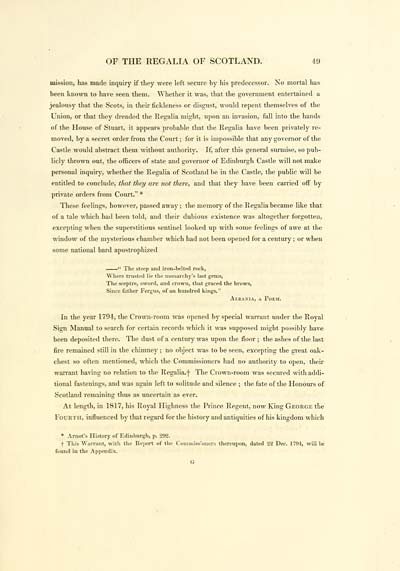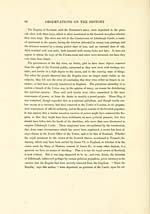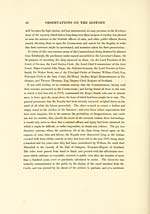Bannatyne Club > Papers relative to the Regalia of Scotland
(85) Page 49
Download files
Complete book:
Individual page:
Thumbnail gallery: Grid view | List view

OF THE REGALIA OF SCOTLAND. 49
mission, has made inquiry if they were left secure by his predecessor. No mortal has
been kno^vn to have seen them. Whether it was, that the government entertained a
jealousy that the Scots, in their fickleness or disgust, would repent themselves of the
Union, or that tiiey dreaded the Regalia might, u])on an invasion, fall into the hands
of the House of Stuart, it appears probable that the Regalia have been privately re-
moved, by a secret order from the Court ; for it is impossible that any governor of the
Castle would abstract them without authority. If, after this general surmise, so pub-
licly thrown out, the officers of state and governor of Edinburgh Castle will not make
personal inquiry, whether the Regalia of Scotland be in the Castle, the public will be
entitled to conclude, that they are not there, and that they have been caiTied off by
private orders from Court." *
These feelings, however, passed away ; the memory of the Regalia became like that
of a tale which had been told, and their dubious existence was altogether forgotten,
excepting when the superstitious sentinel looked up with some feelings of awe at the
window of the mysterious chamber which had not been opened for a century ; or when
some national bard apostrophized
'" The steep and iron-belted rock.
Where trusted lie the monarchy's last gems.
The sceptre, sword, and crown, that graced the brows,
Since father Fergus, of an hundred kings. "
Albania, a Poem.
In the year 1794, the Crown-room was opened by special warrant under the Royal
Sign Manual to search for certain records which it was supposed might possibly have
been deposited there. The dust of a century was upon the floor ; the ashes of the last
fire remained still in the chimney ; no object was to be seen, excepting the great oak-
chest so often mentioned, wliich the Commissioners had no authority to open, their
warrant having no relation to the Regalia.f The Crown-room was secured with addi-
tional fastenings, and was again left to solitude and silence ; the fate of the Honours of
Scotland remaining thus as uncertain as ever.
At length, in 1817, his Royal Highness the Prince Regent, now King George the
Fourth, influenced by that regard for the history and antiquities of his kingdom which
* Amot's History of Edinburgh, p. 292.
f This Warrant, with the Report of the Commiss:oners thereupon, dated 22 Dec. 1791, will be
found in the A])pendix.
mission, has made inquiry if they were left secure by his predecessor. No mortal has
been kno^vn to have seen them. Whether it was, that the government entertained a
jealousy that the Scots, in their fickleness or disgust, would repent themselves of the
Union, or that tiiey dreaded the Regalia might, u])on an invasion, fall into the hands
of the House of Stuart, it appears probable that the Regalia have been privately re-
moved, by a secret order from the Court ; for it is impossible that any governor of the
Castle would abstract them without authority. If, after this general surmise, so pub-
licly thrown out, the officers of state and governor of Edinburgh Castle will not make
personal inquiry, whether the Regalia of Scotland be in the Castle, the public will be
entitled to conclude, that they are not there, and that they have been caiTied off by
private orders from Court." *
These feelings, however, passed away ; the memory of the Regalia became like that
of a tale which had been told, and their dubious existence was altogether forgotten,
excepting when the superstitious sentinel looked up with some feelings of awe at the
window of the mysterious chamber which had not been opened for a century ; or when
some national bard apostrophized
'" The steep and iron-belted rock.
Where trusted lie the monarchy's last gems.
The sceptre, sword, and crown, that graced the brows,
Since father Fergus, of an hundred kings. "
Albania, a Poem.
In the year 1794, the Crown-room was opened by special warrant under the Royal
Sign Manual to search for certain records which it was supposed might possibly have
been deposited there. The dust of a century was upon the floor ; the ashes of the last
fire remained still in the chimney ; no object was to be seen, excepting the great oak-
chest so often mentioned, wliich the Commissioners had no authority to open, their
warrant having no relation to the Regalia.f The Crown-room was secured with addi-
tional fastenings, and was again left to solitude and silence ; the fate of the Honours of
Scotland remaining thus as uncertain as ever.
At length, in 1817, his Royal Highness the Prince Regent, now King George the
Fourth, influenced by that regard for the history and antiquities of his kingdom which
* Amot's History of Edinburgh, p. 292.
f This Warrant, with the Report of the Commiss:oners thereupon, dated 22 Dec. 1791, will be
found in the A])pendix.
Set display mode to: Large image | Transcription
Images and transcriptions on this page, including medium image downloads, may be used under the Creative Commons Attribution 4.0 International Licence unless otherwise stated. ![]()
| Publications by Scottish clubs > Bannatyne Club > Papers relative to the Regalia of Scotland > (85) Page 49 |
|---|
| Permanent URL | https://digital.nls.uk/81105096 |
|---|
| Description | Place of publication Edinburgh unless otherwise stated. No. 125 is relative to but not part of the club's series. |
|---|---|

